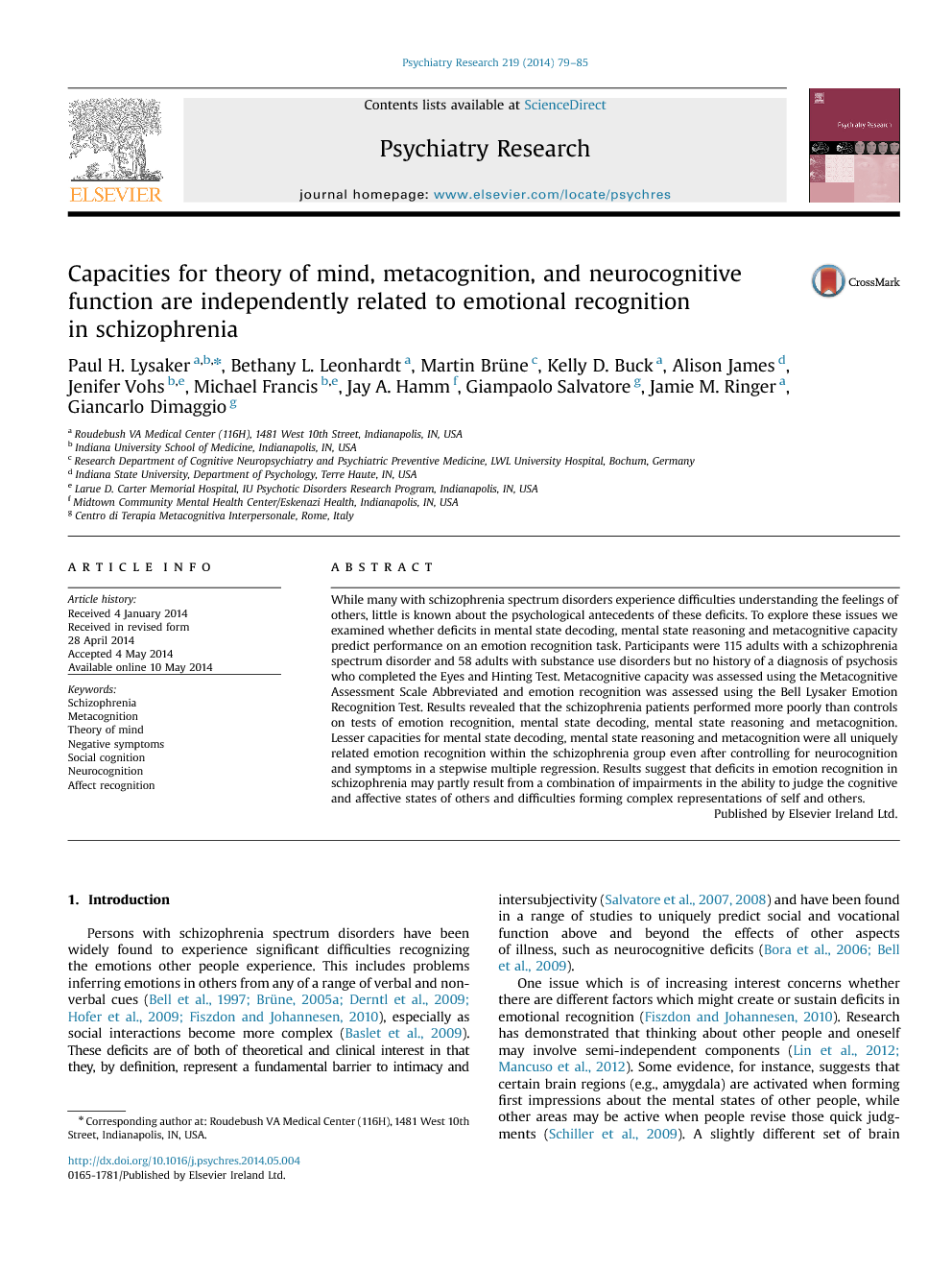Persons with schizophrenia spectrum disorders have been widely found to experience significant difficulties recognizing the emotions other people experience. This includes problems inferring emotions in others from any of a range of verbal and non-verbal cues (Bell et al., 1997, Brüne, 2005a, Derntl et al., 2009, Hofer et al., 2009 and Fiszdon and Johannesen, 2010), especially as social interactions become more complex (Baslet et al., 2009). These deficits are of both of theoretical and clinical interest in that they, by definition, represent a fundamental barrier to intimacy and intersubjectivity (Salvatore et al., 2007 and Salvatore et al., 2008) and have been found in a range of studies to uniquely predict social and vocational function above and beyond the effects of other aspects of illness, such as neurocognitive deficits (Bora et al., 2006 and Bell et al., 2009).
One issue which is of increasing interest concerns whether there are different factors which might create or sustain deficits in emotional recognition (Fiszdon and Johannesen, 2010). Research has demonstrated that thinking about other people and oneself may involve semi-independent components (Lin et al., 2012 and Mancuso et al., 2012). Some evidence, for instance, suggests that certain brain regions (e.g., amygdala) are activated when forming first impressions about the mental states of other people, while other areas may be active when people revise those quick judgments (Schiller et al., 2009). A slightly different set of brain functions may further be related to thinking about oneself and thinking about others (Heberlein et al., 2005, Mitchell et al., 2006, Saxe, 2006 and Tamir and Mitchell, 2010). Other work suggests that cognitive and affective processes can be distinguished from each other when persons think about one another (Decety and Lamm, 2007, Grèzes et al., 2007 and Jenkins and Mitchell, 2010).
Thus it is possible that deficits in emotion recognition may be a function of impairments in a number of semi-independent psychological and cognitive phenomena. Understanding the possible causes of emotion recognition deficits could be of considerable importance if it pointed the way to developing interventions which could address some of its root causes.
In the current study, we have sought to address this issue by examining whether a relationship exists between the capacity for emotional recognition and three sets of psychological processes that could potentially create or sustain deficits in emotional recognition. The first two processes of interest are phenomena linked to Theory of Mind (ToM), which has been found to be impaired in persons with schizophrenia (Greig et al., 2004, McGlade et al., 2008 and Bosco et al., 2009). The first, mental state decoding, refers to the ability to infer the mental states of others on the basis of multichannel information (Pell et al., 2011). The second element, mental state reasoning, conversely refers to the ability to detect another person׳s intentions and to make inferences about the other person׳s knowledge or desire. This element can be examined on the basis of analysis of language in a written task or by using more nonverbal material such as cartoons (Brüne, 2005b). While there is not firm empirical work to support the distinction of these phenomenon, they are theoretically different in that the former involves noticing something about what another person is experiencing (e.g., related thoughts and feelings) while the second involves forming ideas about intentions and goals. Both mental state decoding and mental state reasoning are needed in order to expand impressions of others and to correct potentially erroneous first impressions (e.g., decide that a friendly smile hides a malicious plan).
A third possible antecedent of deficits in emotion recognition we considered is metacognitive capacity. Metacognition is a psychological function. It is a spectrum of mental activities that involves thinking about thinking, ranging from more discrete acts in which people recognize specific thoughts and feelings to more synthetic acts in which an array of intentions, thoughts, feelings, and connections between events, are integrated into larger complex representations (Lysaker and Dimaggio, 2014, Lysaker et al., 2013 and Semerari et al., 2003). Whereas metacognition has been referred to as a part of social cognition (Pinkham et al., in press) one operational difference is that more synthetic forms of metacognition are assessed by analyzing discourse and not by assessing correctness of judgment. Theoretically, this approach diverges from social cognitive assessments in that it seeks to assess a kind of understanding which is greater than the sum of its parts (Lysaker and Dimaggio, 2014). For instance, the synthetic aspects of metacognitive capacity diverge from the constructs of mental state decoding and mental state reasoning in that they do not call as much for the correct detection of a discrete thought or feeling. Instead, synthetic metacognition involves the integration of those details into a whole, whose coherence, rather than absolute correctness, is of concern. Metacognition also includes the complex ability to shift back and forth from one׳s own perspective to the valid and differing perspectives of others.


